‘Climate change is the crisis of our time. Its intensifying impacts are affecting millions of people around the world, the health of our planet, and it is driving species extinction. It is disproportionately affecting the people and communities globally who have contributed the least to creating this planetary emergency.’
Those are the opening words of ‘the People’s Demands for Climate Justice’, a statement issued in 2018 by the Global Campaign to Demand Climate Justice. (The Global Campaign is a coalition which includes 366 organisations from around the world, from Benin to Belgium to Bolivia to Bangladesh, and beyond.)
The COP26 climate negotiations in Glasgow in November did not lead to concrete plans (along the lines of the People’s Demands) that would deal properly with the climate crisis – or that would meet the immediate needs of the most climate vulnerable countries and people.
Britain, as the host country, had set the bar for the talks very low. It said the aim of COP26 was just to ‘keep 1.5 alive’.
That didn’t mean reaching an agreement to limit global heating to 1.5º C warming compared to pre-industrial times. It meant reaching an agreement that made it possible to imagine that in the future the necessary action might be taken to limit global warming to a somewhat safe level.
According to the latest research, published in August, scientists are observing human-caused changes in the Earth’s climate in every region and across the whole climate system. Many of these changes have not been seen in thousands of years, some of them in hundreds of thousands of years.
Some changes already in motion, such as the continued rise in sea levels, are now irreversible over hundreds, perhaps thousands, of years.
Human activities during the industrial age, including producing greenhouse gases such as carbon dioxide and methane, have already caused 1.1º C of warming over the last 170 years or so, the UN’s Intergovernmental Panel on Climate Change (IPCC) reported in August.
Below are speeches made to the world leaders’ summit by some Most Affected People and Areas (MAPA) figures on 1 November, as part of the opening proceedings of COP26.
Ibrahim Mohamed Solih, president of the Maldives
1 November, COP26
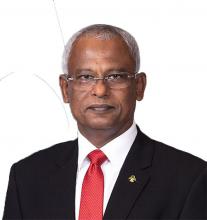
As a leader of a small island state, I have stepped up to many fora to say the exact same things I am about to say now.
But because of the gravity of the situation, because our existence is at stake, I have no choice but to keep on repeating it.
What will it take for you to listen to us?
The Maldives is often cited as one of those low-lying countries that could disappear off the map because of the climate crisis.
I am here to tell you that my people are already living the steady onset of this reality.
Just this past month, I was travelling within the Maldives. Of the six islands I visited, all of them were experiencing severe erosion. This is just one example of how our people are having to live with the harsh realities of climate change. Our islands are slowly being inundated by the sea, one by one.
If we do not reverse this trend, the Maldives will cease to exist by the end of this century.
The science tells us many things. It tells us we are facing a ‘code red’ scenario where global mean temperature is presently at 1.1º Celsius above pre-industrial levels, and is rising at frightening pace towards the 1.5º ceiling.
Wildfires, harsher droughts and storm surges ravage communities around the world with greater intensity and frequency because of climate change.
Based on the science, we know that our capacity to protect the health, wellbeing and safety of our people and our planet is being driven to the brink.
Ladies and gentlemen, as I have said before, if the rise in temperature remains unchecked at 1.5º and jumps to 2º; that is a death sentence to the Maldives.
“The Maldives will cease to exist by the end of this century”
In a world where we cease to exist, our fate would remain a dark omen of the grim future that awaits the rest of the world.
My people are determined not to let this transpire.
We are determined to be part of global solutions to reverse these trends, to change the status quo.
We are determined to lead by example by taking the most ambitious climate actions and committing to achieve a low-emission development and a climate-resilient future.
The climate emergency cannot be solved by the actions of individual nations alone.
Major emitters must step up their nationally-determined contributions [NDCs] and make even more ambitious commitments to achieving Net Zero. Countries must band together and assist the most climate-vulnerable states to adapt to climate change.
Commitments alone are not enough.
At Paris, this assembly reaffirmed its previous pledge to provide $100bn annually to developing vulnerable states. I am disappointed that we are nowhere near to realising this.
Even when a project gets greenlit for financing under these commitments, we are mired in red tape, and a myriad of reports, studies and other assorted paperwork that render ineffective these projects meant to address the urgency imparted on our communities by climate change.
We need to agree on stringent accountability measures to ensure that all commitments on climate finance are met if vulnerable states are to stand a chance.
We have all decided to come to Glasgow, despite the pandemic, with a common purpose.
We all know that this might in fact be the last chance we have to get ahead of climate change.
Please, please do not let this opportunity go to waste.
I thank you.
Sheikh Hasina, prime minister of Bangladesh
1 November, COP26
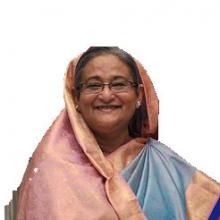
While contributing less than 0.47 percent of global emissions, Bangladesh is one of the most climate-vulnerable countries.
To address this challenge, we established the ‘Bangladesh Climate Change Trust Fund’ in 2009. We have doubled climate-related expenses in the last seven years. Currently, we are preparing the National Adaptation Plan.
Ladies and gentlemen, recently we submitted an ambitious and updated NDC [nationally-determined contribution to reducing global emissions]. Bangladesh has one of the world’s most extensive domestic solar energy programmes.
We hope to have 40 percent of our energy from renewable sources by 2041. We have cancelled 10 coal-based power plants worth $12bn of foreign investment. We are going to implement the ‘Mujib Climate Prosperity Plan’– a journey from climate vulnerability to resilience to climate prosperity. We are trying to address the challenge of climate impact because of 1.1 million forcibly displaced Myanmar nationals or Rohingyas.
As the chair of the Climate Vulnerable Forum (CVF) and V20 [the Vulnerable 20 group of finance ministers of the Climate Vulnerable Forum], we are promoting the interests of the 48 climate-vulnerable countries.
“Bangladesh has one of the world’s most extensive domestic solar energy programmes”
We are also sharing best practices and adaptation knowledge regionally through the South Asia Office of the Global Centre of Adaptation in Dhaka. On behalf of the CVF, Bangladesh is pursuing to establish a Climate Emergency Pact.
Excellencies, let me end with following four points:
First, the major emitters must submit ambitious NDCs, and implement those.
Second, developed countries should fulfil their commitments of providing $100bn annually with a 50:50 balance between adaptation [helping developing countries deal with already-occurring climate change] and mitigation [helping developing countries to reduce their greenhouse gas emissions].
Third, the developed countries should disseminate clean and green technology at affordable costs to the most vulnerable countries. The development needs of the CVF countries also need to be considered.
Fourth, the issue of loss and damage [see p3] must be addressed, including global sharing of responsibility for climate migrants displaced by sea-level rise, salinity increase [more salty seawater damaging the soil and water sources used for agriculture in coastal areas], river erosion, floods, and droughts.
I thank you all.
Mia Mottley, prime minister of Barbados
1 November, COP26
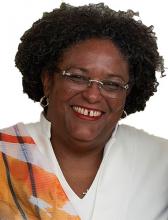
The pandemic has taught us that national solutions to global problems do not work.
We come to Glasgow with global ambition to save our people and our planet but now find three gaps:
On mitigation, climate pledges or NDCs: without more, we will leave the world on a 2.7º pathway.
Those commitments based on technologies yet to be developed are, at best, reckless and, at worst, dangerous.
On finance, we are $20bn short of the $100bn and this commitment might only be met in 2023. [At COP16 in Copenhagen, in 2010, the rich nations of the world promised to ‘mobilise jointly’ $100bn a year ‘by 2020’ to address the needs of developing countries in the face of climate change.]
On adaptation, adaptation finance remains only 25 percent – not the 50:50 split needed, given the warming that is already taking place.
Climate finance to frontline SIDs [small island developing states] declined by 25 percent in 2019.
Failure to provide this critical finance, and that of loss and damage, is measured in lives and livelihoods being lost in our communities.
It is immoral and unjust.
If Glasgow is to deliver on the promises of Paris, it must close these three gaps.
So I ask: what must we say to our people living on the frontline in the Caribbean, Africa and the Pacific when both ambition and some of the needed faces are absent? [Many Pacific small island states and territories did not send any government figures to COP26, because of COVID restrictions and other reasons.]
What excuse should we give for [this] failure? In the words of Eddy Grant: ‘Will they mourn us on the frontline?’
“Can there be peace and prosperity in one-third of the world if two-thirds are facing calamitous threats”
When will we, as world leaders, address the pressing issues that cause our people to worry – be it climate or vaccines?
When will leaders lead?
Our people are watching and taking note.
Are we really going to leave Scotland without the resolve and ambition that is sorely needed to save lives and to save our planet?
I have been saying to Barbadians: ‘Many hands make light work’. Today we need the correct mix of voices and ambition.
Do some leaders believe they can survive and thrive on their own?
Can there be peace and prosperity in one-third of the world if two-thirds are under siege and facing calamitous threats to their wellbeing?
What the world needs now is less than 200 persons who are willing and prepared to lead!
Leaders must not fail those who elect them to lead.
There is a sword that can cut down this Gordian knot. It has been wielded before.
The central banks of the wealthiest countries engaged in $25 trillion of quantitative easing in 13 years. $9 trillion in 18 months.
Had we used the $25 trillion to purchase bonds that financed the energy transition, we would be keeping within 1.5º.
An annual increase in SDRs of $500bn for 20 years put in a trust to finance the transition is the real gap we need to close, not the $50bn being proposed for adaptation. [SDRs, or special drawing rights, are effectively foreign currency grants given to countries by the IMF.]
If $500bn sounds big to you, it is just two percent of that $25 trillion. This is the sword we need to wield.
Our excitement one hour into this event is far less than six months ago in the lead-up.
The world stands at a fork in the road; one no less significant than when the United Nations was first created in 1945.
Will we act in the interest of our people who are depending on us or will we allow the path of greed and selfishness to sow the seeds of our common destruction?
Leaders today, not leaders in 2030 or 2050, must make this choice.
It is in our hands. Our people and our planet need it.
Elizabeth Wathuti, climate activist from Kenya
1 November, COP26
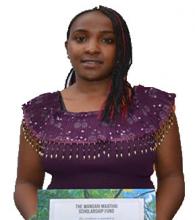
My name is Elizabeth Wathuti.
I am a youth climate activist from Kenya.
I have done a lot of soul-searching about what to say here today.
I have asked myself over and over what words might move you.
And then I realized that making my four minutes count does not rest solely on me.
My truth will only land if you have the grace to fully listen.
My story will only move you if you can open up your heart.
I can urge you to act at the pace and skill necessary, but in the end, your will to act must come from deep within.
I need to tell you what is happening in my home country.
Right now, as we sit comfortably here in this conference centre in Glasgow, over two million of my fellow Kenyans are facing climate-related starvation.
In this past year, both of our rainy seasons have failed, and scientists say that it may be another 12 months before the waters return again.
Meanwhile, our rivers are running dry.
Our harvests are failing.
Our storehouses stand empty.
Our animals and people are dying.
I have seen, with my own eyes, three young children crying at the side of a dried-up river after walking 12 miles with their mother to find water.
Please open your hearts.
This is not only happening in Kenya.
Over the past few months, there have been deadly heatwaves and wildfires in Algeria, and devastating floods in Uganda and Nigeria.
And there is more still to come.
By 2025, in just four years’ time, half of the world’s population will be facing water scarcity.
And by the time I’m 50, the climate crisis will have displaced 86 million people in sub-Saharan Africa alone.
I would like you to join me in holding a moment of compassionate silence for the billions of people who are not here with us today, whose stories are not being heard and whose suffering is not being felt.
Please open your hearts.
“I have asked myself over and over what words might move you.”
If you allow yourself to feel it, the heartbreak and the injustice is hard to bear.
Sub-Saharan Africans are responsible for just half a percent of historical emissions.
The children are responsible for none, but they are bearing the brunt.
We are the adults on this Earth right now, and it is our responsibility to ensure that the children have food and water.
I have been doing what I can.
Inspired by the great professor Wangari Mathaai, I founded the Green Generation Initiative, a tree-growing initiative that enhances food security for young Kenyans.
So far, we have grown 30,000 fruit trees to maturity, providing desperately needed nutrition for thousands of children.
Every day, we see that when we look after the trees, they look after us.
But these trees, and the life-saving fruit they bear, will not survive on a 2.7º C-warmer planet.
The decisions you make here will help determine whether the rains will return to our land.
The decisions you make here will help determine whether the fruit trees we plant will live or perish.
The decisions you make here will help determine whether children will have food and water.
I believe in our human capacity to care deeply and to act collectively.
I believe in our ability to do what is right if we let ourselves feel it in our hearts.
So for these next two weeks, let us feel it in our hearts.
The children cannot live on words and empty promises.
They are waiting for you to act.
Please, open your hearts.
And then act.
Thank you.
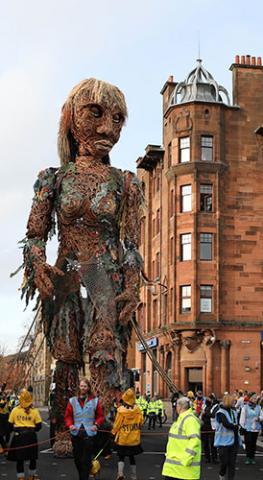
PHOTO: SCOTTISH GOVERNMENT, (CC BY 2.0)


